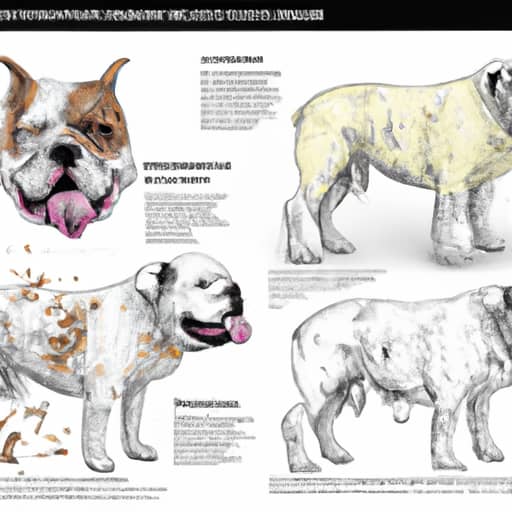Do Border Collies Bark A Lot? How To Put A Stop To Barking Border Collie
Do Border Collies Bark A Lot? Discover why Border Collies bark excessively and learn effective training techniques to curb their Barking Border Collie behavior. Put a stop to the noise and enjoy a more peaceful household with your intelligent and energetic companion.
So, you’ve got yourself a Border Collie, huh? They’re such intelligent and energetic dogs, aren’t they? But maybe you’ve noticed that they also have quite the talent for barking. You find yourself wondering if this is normal for the breed or if there’s something you can do about it. Well, I’ve got good news for you – we’re going to dive into the topic of Border Collie barking, and I’ll give you some tips on how you can put a stop to it.
Now, let’s talk about Border Collie barking in detail. You see, Border Collies are known for their vocal nature. They have a lot to say, and they aren’t afraid to let you know about it. But excessive barking can be a problem, especially if you live in close quarters or have sensitive neighbors. The good news is, with a bit of training and understanding, you can help curb this behavior.
In our upcoming article, we’ll explore the reasons behind your Border Collie’s excessive barking. We’ll discuss the potential triggers and factors that contribute to their vocalizing tendencies. We’ll also dive into different training techniques and strategies you can implement to put a stop to the excessive barking. So, stay tuned, because by the end of it, you’ll have all the tools you need to enjoy a quieter and more peaceful household with your beloved Border Collie.
Understanding Border Collie Behavior
Border Collies are known for their intelligence and work ethic, making them highly sought after as herding dogs. However, one trait that can sometimes be challenging for their owners is their tendency to bark excessively. In this article, we will explore the reasons behind excessive barking in Border Collies and discuss effective techniques to mitigate this behavior.
Border Collies and Barking
Barking is a natural behavior for dogs, including Border Collies. It is their way of communicating and expressing their emotions. However, when barking becomes excessive and uncontrollable, it can become a nuisance for both the owner and the neighbors. It is essential to understand the reasons behind this behavior in order to address it effectively.
Reasons for Excessive Barking in Border Collies
There are several reasons why Border Collies may engage in excessive barking:
- Boredom: Border Collies are highly intelligent and energetic dogs. If they do not receive adequate mental and physical stimulation, they may become bored and resort to barking as a means of entertainment.
- Lack of Exercise: Border Collies have an innate need for physical exercise. Insufficient exercise can lead to pent-up energy, which may manifest as excessive barking.
- Separation Anxiety: Border Collies thrive on companionship and can become anxious when left alone for extended periods of time. Barking may be a result of their anxiety and attempt to seek attention.
- Territorial Behavior: Border Collies are known for their strong herding instincts and may bark excessively to protect their territory. They may view anything or anyone approaching their designated space as a potential threat.
Impact of Excessive Barking on Border Collies
Excessive barking can have negative consequences for Border Collies’ well-being:
- Stress: Continuously barking can lead to heightened stress levels in Border Collies. Chronic stress can impact their overall health and quality of life.
- Disturbed Sleep: Excessive barking, especially at night, can disrupt the dog’s sleep patterns, leading to fatigue and behavioral issues during the day.
- Relationship Strain: Excessive barking can strain the relationship between the owner and the dog, as well as cause tension among neighbors. It is essential to address this behavior to maintain a peaceful coexistence.
Identifying Triggers for Excessive Barking
To effectively address excessive barking in Border Collies, it is crucial to identify the triggers that lead to this behavior. Some common triggers include:
Common Triggers for Barking in Border Collies
- Strangers or Intruders: Border Collies may bark excessively when they perceive a stranger entering their territory or approaching their home.
- Other Animals: The presence of other animals, such as squirrels, cats, or even other dogs, can trigger barking in Border Collies.
- Loud Noises: Border Collies may react to loud noises, such as thunderstorms, fireworks, or even the sound of a vacuum cleaner, by barking excessively.
Environmental Factors that Contribute to Barking
- Lack of Stimulation: Insufficient mental and physical stimulation can result in boredom, leading to excessive barking.
- Isolation: Border Collies are social dogs and can become anxious when left alone for long periods. This isolation can trigger barking as a form of communication.
- Changes in Routine: Border Collies thrive on routine and can become anxious and vocal when there are significant changes to their daily schedule.
Separation Anxiety and Barking
Separation anxiety can be a significant trigger for excessive barking in Border Collies. They form strong attachments to their owners and can become distressed when left alone. Barking may be their way of seeking reassurance or expressing their anxiety.
Training Techniques for Barking Control
The good news is that excessive barking in Border Collies can be effectively controlled and managed through proper training techniques. Here are some methods to consider:
Positive Reinforcement Training Methods
Positive reinforcement training involves rewarding desirable behavior to encourage its repetition. This can be utilized to address excessive barking. Whenever your Border Collie remains quiet in a situation that would typically trigger barking, reward them with treats, praise, and affection. This will reinforce the quiet behavior and encourage them to repeat it in the future.
Teaching Quiet Command to Border Collies
Teaching your Border Collie a “quiet” command can be instrumental in curbing excessive barking. Start by saying the command firmly and then rewarding your dog when they stop barking. With consistent practice and positive reinforcement, your dog will learn to associate the command with ceasing their barking.
Redirecting Energy and Focus
Ensuring that your Border Collie receives sufficient mental and physical stimulation is crucial in preventing excessive barking. Engage them in activities that redirect their energy, such as interactive games, puzzle toys, or even obedience training. By providing a constructive outlet for their energy, you can help reduce their tendency to bark excessively.
Creating a Peaceful Environment
Providing a peaceful and stimulating environment for your Border Collie is essential in curbing excessive barking. Here are some strategies to consider:
Providing Sufficient Exercise
Border Collies are an active breed with high energy levels. Regular exercise, such as daily walks, runs, or playtime in a fenced yard, can help expend their energy in a positive way. A tired Border Collie is less likely to engage in excessive barking.
Mental Stimulation for Border Collies
In addition to physical exercise, Border Collies require mental stimulation to keep their minds engaged and prevent boredom. Provide them with puzzle toys, treat-dispensing toys, or engage in obedience training sessions to challenge their intellect and keep them mentally stimulated.
Structured Daily Routine
Border Collies thrive on routine and predictability. Establishing a structured daily routine can help reduce anxiety and prevent excessive barking. Consistent mealtimes, exercise sessions, and playtime will provide a sense of stability and security for your Border Collie.
Seeking Professional Help
If your efforts to control excessive barking in your Border Collie are not yielding satisfactory results, it may be helpful to seek professional guidance. Consider the following options:
Consulting a Veterinarian or Dog Behaviorist
A veterinarian or a certified dog behaviorist can provide valuable insights into your Border Collie’s behavior and offer guidance on how to address excessive barking. They can assess your dog’s specific needs and recommend customized training plans or behavioral modification techniques.
Behavioral Modification Programs
Behavioral modification programs, conducted by experienced trainers or behaviorists, can be beneficial in addressing excessive barking. These programs aim to modify the dog’s behavior through positive reinforcement training and may involve desensitization techniques for specific triggers.
Medication and Supplements
In severe cases where excessive barking is a result of underlying anxiety or fear, medication or natural supplements prescribed by a veterinarian may be considered. These can help reduce anxiety levels and make training more effective.
Utilizing Distraction Techniques
Distracting your Border Collie from barking triggers can be an effective strategy. Here are a few techniques to consider:
Toys and Interactive Games
Providing your Border Collie with interactive toys, such as puzzle toys or treat-dispensing toys, can redirect their focus and energy from barking to playing. These toys offer mental stimulation and can keep your dog occupied during times when barking triggers are present.
Chew Treats and Puzzles
Chew treats and puzzle toys that require your Border Collie to solve a problem or work for the treat can keep them engaged and distracted from barking. These types of activities can be particularly useful during times when your dog is prone to excessive barking, such as when visitors arrive.
White Noise or Music
Playing background white noise or calming music can help drown out external noises that may trigger excessive barking in your Border Collie. This can create a more peaceful environment and reduce their urge to bark.
Consistency and Patience in Training
Training your Border Collie to reduce excessive barking requires consistency and patience. Here are some key principles to keep in mind:
Establishing Clear Rules and Boundaries
Consistency is crucial when setting rules and boundaries for your Border Collie. Make it clear to them when barking is appropriate and when it is not. Establishing consistent expectations will help them understand what behavior is considered acceptable.
Reinforcing Training on a Regular Basis
Training should not be a one-time event. Consistently reinforce your Border Collie’s training by practicing commands and rewarding appropriate behavior. Regular reinforcement and consistent practice will help solidify the new behavior and reduce the likelihood of relapse into excessive barking.
Remaining Calm and Patient
Dogs are sensitive to their owner’s emotions. Remaining calm and patient during the training process will create a positive and peaceful environment. Your Border Collie will respond better to training techniques when they sense your calm and assertive energy.
Avoiding Negative Reinforcement
Using punishment-based training techniques or negative reinforcement can be detrimental to a Border Collie’s well-being and can worsen excessive barking. It is important to consider alternative approaches that focus on positive reinforcement and reward-based training.
Negative Effects on Border Collies
Punishment-based training techniques can lead to fear, anxiety, and increased stress in Border Collies. This can exacerbate their barking issues and strain the bond between owner and dog. It is best to avoid such methods and focus on positive training techniques instead.
Alternative Approaches
Positive reinforcement training techniques, such as rewarding desirable behavior and redirecting their attention away from triggers, can be highly effective in reducing excessive barking. These methods promote a trusting and positive relationship between owner and dog.
Teaching Calmness and Relaxation
Teaching your Border Collie to be calm and relaxed in different situations can greatly help in reducing excessive barking. Here are some strategies to consider:
Introducing Relaxation Techniques
Introduce relaxation techniques, such as deep breathing exercises, massage, or aromatherapy, to help your Border Collie associate calmness with specific cues. This can be particularly useful in situations where your dog is prone to barking, such as during thunderstorms or fireworks.
Creating a Quiet Space for Border Collies
Designate a quiet and comfortable space for your Border Collie where they can retreat and relax when needed. Ensure that this area is secure and free from external triggers that may cause excessive barking. Providing a safe and quiet space can help them find solace and reduce their urge to bark.
Rewarding Calm Behavior
Whenever your Border Collie demonstrates calm behavior in situations that would typically trigger excessive barking, be sure to reward and praise them. Positive reinforcement will strengthen their association between calmness and positive experiences, making it easier for them to exhibit this behavior in the future.
Conclusion
Excessive barking in Border Collies can be a challenging behavior to address, but with a systematic and patient approach, it can be resolved. By understanding the reasons behind their barking, identifying triggers, implementing effective training techniques, and creating a peaceful environment, you can establish a balanced barking behavior for your Border Collie. Remember to seek professional help when necessary and focus on maintaining a strong bond with your furry companion. With dedication and consistency, you can enjoy a peaceful coexistence with your beloved Border Collie.











